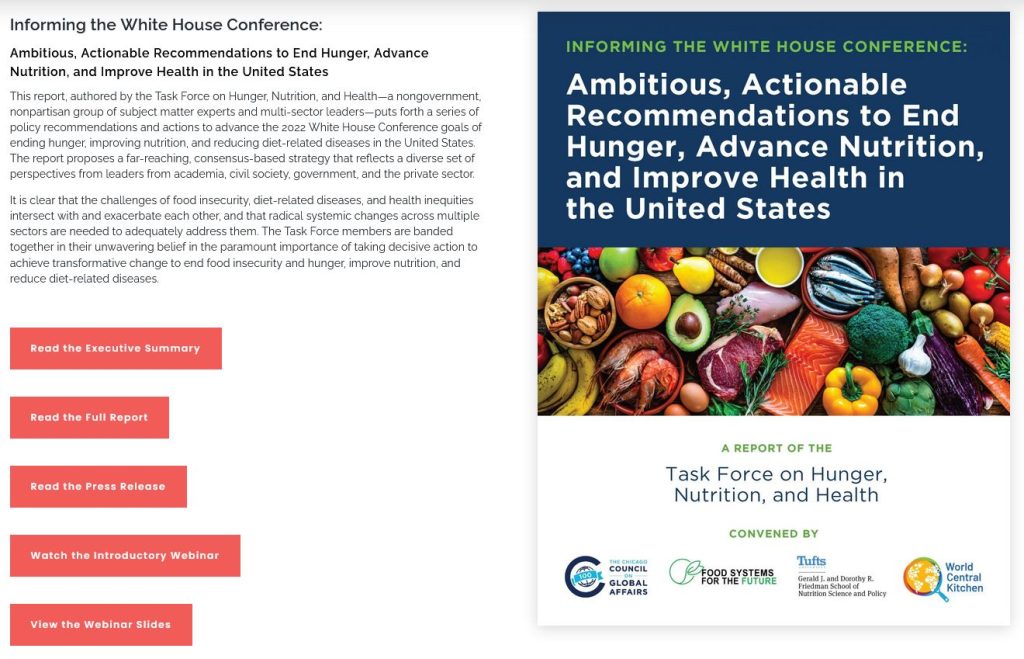The Standard American Diet (SAD) is not known for optimizing health and improving longevity. Almost half of U.S. deaths from heart disease are linked to unhealthy food choices. People who have lower incomes have even worse health-related outcomes. “It is clear that the challenges of food insecurity, diet-related diseases, and health inequities intersect with and exacerbate each other, and that radical systemic changes across multiple sectors are needed to adequately address them.” (Task Force)
“We’re really in a nutrition crisis in this country.”
says Dariush Mozaffarian, a cardiologist and dean of the Friedman School of Nutrition Science and Policy at Tufts University.

Nutrition Task Force Recommendations
The good news is that there is growing momentum to address this problem. A newly convened Task Force on Hunger has put together a comprehensive plan to improve the nutrition of Americans.
The Task Force members have an unwavering belief in the “importance of taking decisive action to achieve transformative change to end food insecurity and hunger, improve nutrition, and reduce diet-related diseases.”
White House Conference Sept 28th
The Biden administration will hold the White House Conference on Hunger, Nutrition, and Health on September 28th with the agenda driven by the Task Force Recommendations.
Afterward, they will announce a new national strategy to improve access to healthier foods based on these tenets.
Seven Big Ideas Recommended by Task Force on Hunger, Nutrition and Health
1. Treat Food as Medicine
There is growing momentum to integrate food and nutrition into regular health care through innovative strategies. Providing prescriptions for healthy groceries coupled with nutrition education is an idea that is being piloted around the country. In this model, health care systems or insurers pay for groceries to help people make significant changes to their eating habits.
2. Focus on the Quality of Calories, not just the Quantity
Historically, federal food assistance programs have helped to address hunger. Policies and programs have historically focused on improving access to sufficient quantities of food. Now there is momentum to modernize this approach and focus on the quality of food and make sure people have adequate access to enough nutritious food.
3. Expand Access to Dietary and Lifestyle Counseling
The task force recommends more preventive behavioral lifestyle coaching by providers as a part of usual care. They also recommend that Congress expand Medicare and Medicaid coverage for medical nutrition therapy for people with hypertension, prediabetes, celiac disease, HIV/AIDS, cancer and other diet-related conditions. There is also a call for expanded coverage of cooking classes and nutrition assistance, as well as coverage of the Diabetes Prevention Programs delivered by telehealth.
4. Support Food Entrepreneurs
By supporting individuals who start food businesses, they can help nourish communities and create jobs. The task force calls on the federal government to pass policies that boost new healthy food enterprises, including providing new loans and grants to food and nutrition-related companies centered on health, equity, and sustainability. The idea is to focus especially on businesses owned by people of color and other marginalized groups.
5. Increase the number of new farmers growing healthy foods using regenerative farming techniques
The U.S. has invested heavily in monoculture with a focus on producing corn and soybeans on most cropland. Now, there’s growing recognition of the need for more specialty crops – including fruits, vegetables, and nuts. To promote crop diversity, the task force proposed providing new farmers with paid internships and apprenticeships to learn about sustainable farming and funding to cover a living wage and housing. Read more here Beginning Farmers and Ranchers Development Program.
6. Make school meals free for all students
Many families who are eligible for free or reduced-priced meals may not receive them, sometimes due to the paperwork, bureaucracy or stigma of participating or enrolling. Amid the pandemic, school meals have been offered for free to all students. Now, the task force says this should be a permanent change.
7. Establish a Federal Agency and National Director of Food and Nutrition.
To initiate and formulate these bold and common sense changes, the task force recommends the creation of a new role in the federal government; a National Director of Food and Nutrition. This department could evaluate the success of programs, make adjustments and expand and fund programs that work.
Click here to access the Full report and dive into the details

The use of DES products does not guarantee the successful passage of the CDCES exam. CBDCE does not endorse any preparatory or review materials for the CDCES exam, except for those published by CBDCE.









